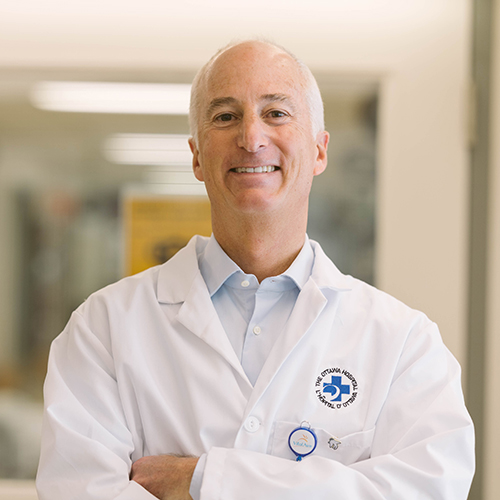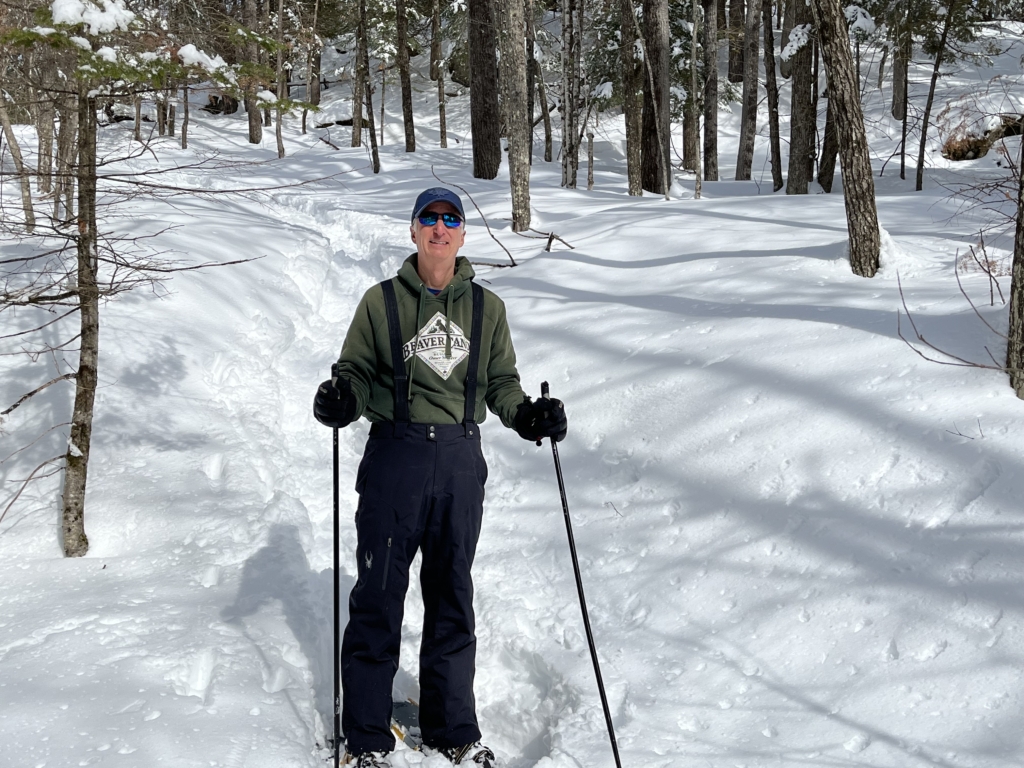
Dr. Shawn Aaron never intended to go into research. Early in his career, the respirologist — a doctor who specializes in lung disease — saw his future as working directly with patients. But after falling in love with research at The Ottawa Hospital, Dr. Aaron became a senior scientist working at the intersection of research and clinical care.
Dr. Aaron is also Principal Investigator and Director of The Canadian Respiratory Research Network, whose goal is to bring together researchers across disciplines to work together to improve the understanding of the origins and progression of chronic airway diseases in Canada.
In recognition of his practice-changing research, he has been named the 2023 recipient of the Dr. J. David Grimes Career Achievement Award.
Read on to learn why Dr. Aaron chooses to work at The Ottawa Hospital, what he’s excited about for the future, and why research isn’t like tennis.
Q: Can you tell us a little bit about your path into medicine?
A: I was born in Montreal, back in the dark ages of 1964. I’m the last of the Baby Boomers. I grew up in Montreal, went to public school there, went to McGill for my undergraduate degree, and then continued into medical school at McGill. When I finished, I went to Toronto and trained to be an internist and a respirologist — that is a doctor who specializes in lung disease. After that, I trained in intensive care medicine. When I finished, I just couldn’t get enough of training. So, I came to Ottawa, and I did a master of science in epidemiology. I finished my masters in 1999, and by then, at the age of ’99 minus ’64, I thought I was finished.
And then I started my research career.
Q: What drew you to research?
A: I thought I was simply going to be a physician in the community doing respiratory medicine. But when I was looking for a job in that field, my wife — who is an obstetrician gynecologist and grew up here — wanted to come to Ottawa. I reached out to The Ottawa Hospital, and they said, “We’d love to have you, but we want you to train to be a researcher.” I said, “Great. Sure. I’ll try it.” In the end, I fell in love with the idea of doing research for a living.
“Research is not a single-person sport.”
Dr. Shawn Aaron
Research is not a single-person sport. It’s not tennis; research is football or baseball. I work with statisticians, research program managers, and research coordinators. There’s a whole team that supports research. And without that team, there’s no way that I could ever have been successful. I am perhaps the coach of a football team.
Q: You specialize in cystic fibrosis and COPD, two chronic lung diseases. Can you tell us a little bit more about them?
A: They’re both debilitating lung diseases. Cystic fibrosis is genetic, so it affects young people, in their infancy. In the old days, when I first started practicing, our patients were routinely dying in their 20s and 30s. It was devastating. You can imagine how awful that is for the patients and their families and even for their healthcare providers. The good news is that in the last five or six years, we have dramatically improved treatments for cystic fibrosis. Our patients are living almost normal lives. And we expect their life expectancy, when we have more data, will probably be at least in the 60s or 70s. It’s a fantastic achievement, and clinically, it’s brought me incredible joy in my career.
COPD (chronic obstructive pulmonary disease), is the exact opposite of cystic fibrosis. It’s a disease of older people. It’s debilitating because it causes people to become very short of breath. Many of them require oxygen, you might see them on the street, walking with oxygen tubing in their nose. The most frustrating part of COPD is that we haven’t yet developed those magic cures like we have for cystic fibrosis. Unfortunately, in my 30 years of practice, my patients with COPD are still quite disabled, and still, unfortunately, dying of their disease.
Q: How is the research you do changing the care patients receive?
A: I turned my master’s thesis into a New England Journal of Medicine article, so you could say I peaked early. It was a study where we took patients presenting with acute crises in their COPD. We showed that when we gave them prednisone, a strong anti-inflammatory steroid drug, they had fewer relapses. We proved prednisone works for this. The proof wasn’t there before, and now prednisone is the standard of care.
Later on, I worked on a study on using a combination of inhalers to treat COPD. We wanted to see if we could prevent crises by treating them with a combination of inhalers. We hypothesized — I mean, it’s not rocket science — that if you combine inhalers, you might get better bang for your buck. We did the first clinical trial to use triple therapy for COPD, and we showed it was better for many outcomes.
In terms of research I’m doing now, we have a large study that will finish in January 2024. The research is trying to address that fact that we as health care professionals are currently doing a poor job of picking up and treating COPD. The basic problem with COPD care in 2023 is that by the time the patient comes to see a doctor complaining of shortness of breath, it’s too late. They’ve already lost their lungs; their lungs have been dissolved out. Unfortunately, this means doctors are closing the barn door after the horses have bolted; we’re trying to treat a disease that already has progressed dramatically. What I’m addressing with my research is whether we can catch the disease at a much earlier stage than with conventional diagnosis — and get treatment started much earlier to prevent disease progression, disability, and death.
In this study, we’ve recruited over 3,000 randomly selected Canadians who are complaining of respiratory symptoms but have never been diagnosed with any lung disease. We’re using spirometry, a simple test in which the patients blow into a tube and we measure how quickly they blow. The test is safe and simple and takes 15 minutes. Based on those tests, we’re diagnosing people with either COPD or asthma that has never been diagnosed before. In other words, these are people who are walking around in the community who are short of breath or coughing or wheezing and don’t know they have a disease. Once we find the disease, we’re doing a clinical trial where we randomize them into intensive treatment or usual care. Our goal is to see if by finding the disease early, and treating it early with intensive treatment and education, we can improve patient outcomes. I think it’s very exciting because we’re actually doing something that’s never been done before to try and catch and treat people early to see if we can improve the course of their disease.
Q: Why have you chosen to work at The Ottawa Hospital for so long?
A: The Ottawa Hospital gave me my big break. I was sort of like a rookie being drafted, and they thought I was promising enough to take me on, so I guess I’ve always felt an affinity to them. There are other reasons, though. The Ottawa Hospital and the University of Ottawa really nurture young researchers, and they allow us to develop at our own pace. They provide us with the support we need.
“The Ottawa Hospital is an amazing place to do research and clinical work, not just in Canada, but within the world.”
Dr. Shawn Aaron
The Ottawa Hospital is an amazing place to do research and clinical work, not just in Canada, but within the world. We have an incredible group of researchers who are world class. It’s things like cell-based therapeutics, clinical epidemiology, muscle physiology, molecular biology, and neuroscience. If you come here, you’re going to obtain great mentorship, you’re going to have great opportunities for collaboration, and you’re going to come into a very supportive environment, which is going to nurture you towards success.
Q: What excites you about the future of respirology?
A: I think the exciting part about the future is figuring out new modalities to treat COPD and asthma better. As I said earlier, one of those is going to be identifying patients early and trying to treat them early. I think in the next five years, we’re going to look at the clinical benefits of identifying patients early, but also the economic benefits. We’re also going to try and figure out how to use machine learning techniques, or AI, to do this early identification even better. Right now, we’re doing it with good old-fashioned questionnaires and phone interviews to figure out who might be sick and who should come in for testing.
Q: How does it feel to receive the Dr. J. David Grimes Career Achievement Award recognizing the work you’ve done?
A: I felt a few ways. One was incredibly humbled; I really didn’t feel I was deserving of the award because I know amazing scientists at The Ottawa Hospital, and I know many of them are much smarter and better than I am. I was surprised I actually got the award. But I was very pleased, obviously. My second reaction was to have a little bit of chagrin, because the Grimes award is for career achievement, so it’s usually given to people who are either on the verge of retiring, or who have retired. This was a sign that I am getting near the end of my career, but I think I still have five years left before I fade into oblivion. I am determined to make the best of what I have left and to continue to do important research.
Q: Where would we find you when you’re not in the lab or clinic?
A: That’s easy. I’m going to be at the cottage, in the Outaouais, kayaking in the summer, snowshoeing in the winter. It’s my happy place. I’m hoping I can retire with my health and enjoy those activities.


